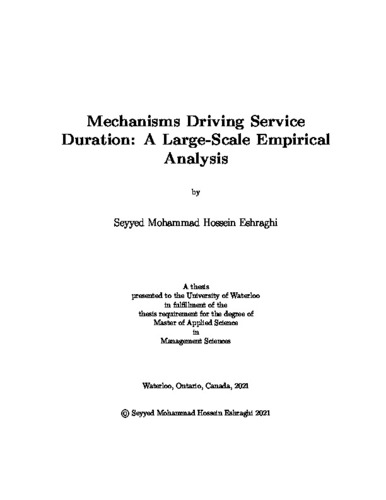| dc.contributor.author | Eshraghi, Seyyed Mohammad Hossein | |
| dc.date.accessioned | 2021-09-28 13:47:54 (GMT) | |
| dc.date.available | 2023-09-29 04:50:05 (GMT) | |
| dc.date.issued | 2021-09-28 | |
| dc.date.submitted | 2021-09-18 | |
| dc.identifier.uri | http://hdl.handle.net/10012/17561 | |
| dc.description.abstract | Using large-scale MRI services data, a multi-type multi-priority scheduling system, we measure service duration and show that a number of covariates, including the shift during which the procedure is performed, patients' priority, case mix workload of the proceeding patients and batching of similar procedures affect service duration.
We find that the effects of various mechanisms on service duration may depend on the hospital type (teaching or community hospitals) and customer type (high priority versus low priority patient). For instance, adjusting for other factors, we find that MRI scan duration for emergent patients during the night shifts is significantly longer than the day shifts (around 4%) and the decrease is even higher in teaching hospital settings (around 8%), but low priority patients undergo shorter procedure duration during night shifts. We also show that the inverted-U-shaped relationship observed between the service duration and workload in the literature is also evident in the MRI services. We also find that sequencing consecutive procedures of similar body types is a significant mechanism that reduces patients' MRI scan time. As a result, adding an extra job of a similar scan type reduces the service time by 4%. We find that the effects of workload and sequencing are both endogenous, thus the OLS estimator might fail to determine the true effects. Thereby, we constructed a simultaneous equations model and used a three-stage least square (3SLS) estimator to correct the endogeneity and simultaneity biases of workload and sequencing factors, respectively. | en |
| dc.language.iso | en | en |
| dc.publisher | University of Waterloo | en |
| dc.subject | empirical analysis | en |
| dc.subject | queueing systems | en |
| dc.subject | MRI services | en |
| dc.subject | behavioral operations management | en |
| dc.subject | simultaneous equations model | en |
| dc.subject | econometrics | en |
| dc.title | Mechanisms Driving Service Duration: A Large-Scale Empirical Analysis | en |
| dc.type | Master Thesis | en |
| dc.pending | false | |
| uws-etd.degree.department | Management Sciences | en |
| uws-etd.degree.discipline | Management Sciences | en |
| uws-etd.degree.grantor | University of Waterloo | en |
| uws-etd.degree | Master of Applied Science | en |
| uws-etd.embargo.terms | 2 years | en |
| uws.contributor.advisor | Abouee-Mehrizi, Hossein | |
| uws.contributor.affiliation1 | Faculty of Engineering | en |
| uws.published.city | Waterloo | en |
| uws.published.country | Canada | en |
| uws.published.province | Ontario | en |
| uws.typeOfResource | Text | en |
| uws.peerReviewStatus | Unreviewed | en |
| uws.scholarLevel | Graduate | en |

